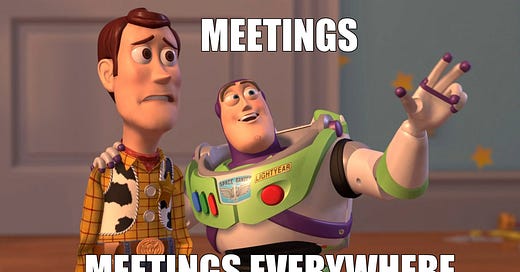As a PM you spend a lot of time in meetings, but not all of that is time well spent. In this article, I’ll show you how to identify and eliminate low-value meetings and double down on those that do provide value. This way you can increase the speed of your team and protect your energy.
Meetings are not the job
At Picnic I spend ~50% of my time in meetings. It felt like every one of them was super important, and my role in them made me super important.
I was wrong. It actually meant that high leverage work (specs, strategy, analysis, talking to users) had to be jammed into the other 50% of the week. Basically, I was working part-time 🤷 I wasn’t the only one. 10 PMs I’ve surveyed are in meetings 40-60% of their time. Ouch.
Which meetings should you spend your time on?
Not all meetings are the same. I use a simple framework to decide how to treat each meeting. I answer two questions:
Is it important? (to the company, product, team)
Am I the right person?
Getting out of bad meetings
PMs should be masters in the art of saying no. Here are the three tactics Will Lawrence shared for cutting low-value meetings from his calendar:
🙅♀️ Decline
If you notice you are not giving or receiving helpful info, and the meeting is not adding value, try declining the invite.
Hi Sarah, can we make this meeting optional and only meet when urgent things come up?”🤝 Delegate
Maybe a meeting is important, but you are not uniquely well-positioned to lead it. In that case, it might be good to delegate it to teammates.
“Hi Sarah. Would you like to present at the product review this week? This will give you and your work more visibility.”❌ Delete
If a meeting isn’t valuable to your company or product, it’s better for everyone to delete it.
"Hi all, I don’t think we need to have this meeting. I propose to move to a weekly update in Slack.”
Doubling down on good meetings
Great teams squeeze the most value out of every minute they meet. But this can only be done if you run them well. A few things that make meetings 10x better:
Prepare
Share a clear agenda in advance, including the goal of the meeting.Keep it small
Only invite the relevant people (keep it <7).Be punctual
Start and end on time (this is your responsibility)Share notes
Share notes after the meeting. They serve as a public record of what was discussed and decided. I always share notes via Slack, so they’re visible and people can comment.Follow up
Meetings should lead to actions. So make sure to follow up, both on your own and others’ to-dos. I set reminders in Slack to make this follow-up easier.
Closing thoughts
Most PMs think a full day of meetings is part of the job. But great PMs eliminate bad meetings and double down on good ones to increase the impact of their team.
Some takeaways to help your team deliver more value:
Categorize your meetings and prioritize accordingly
Get out of the meetings that don’t add value by using the 3 strategies (delete, decline, delegate)
Double down on the valuable meetings to do creative work and make decisions
Spend your surplus time on high-leverage tasks.
If you’re new to Amsterdam Product Club, subscribe below for actionable lessons for product managers.
Until next month!






This is an incredible post! If it helps, we are building Dive (letsdive.io) to help you make the most of your meetings. You can prepare easily, align people before the meetings, timebox discussions and the best part - it automatically shares notes and action items post meeting.